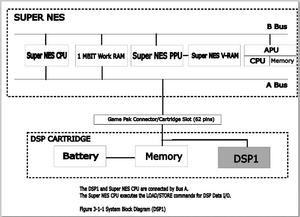We've just updated MediaWiki and its underlying software. If anything doesn't look or work quite right, please mention it to us. --RanAS
DSP1: Difference between revisions
From SnesLab
(added system block diagram) |
(internal rom) |
||
| Line 22: | Line 22: | ||
* [[DSP1/Target]] | * [[DSP1/Target]] | ||
* [[DSP1/Triangle]] | * [[DSP1/Triangle]] | ||
The code implementing them is in the DSP1's internal ROM. | |||
The DSP1 hardware supports [[DMA]], but the SNES does not have a way to kick it off. <sup>[2]</sup> | The DSP1 hardware supports [[DMA]], but the SNES does not have a way to kick it off. <sup>[2]</sup> | ||
Revision as of 04:22, 4 January 2024
DSP1 in an enhancement chip with part number 22943 that implements common 3D math operations.
The DSP1 has registers named DR and SR.
The following commands are supported:
- DSP1/Attitude
- DSP1/Distance
- DSP1/Gyrate
- DSP1/Inverse
- DSP1/Multiply
- DSP1/Objective
- DSP1/Parameter
- DSP1/Polar
- DSP1/Project
- DSP1/Radius
- DSP1/Range
- DSP1/Raster
- DSP1/Rotate
- DSP1/Scalar
- DSP1/Subjective
- DSP1/Target
- DSP1/Triangle
The code implementing them is in the DSP1's internal ROM.
The DSP1 hardware supports DMA, but the SNES does not have a way to kick it off. [2]
In Figure 3-1-1 of the manual, the connection between the DSP1 chip and the 62-pin cartridge slot incorrectly appears outside the game pak.[3]
External Links
- https://snescentral.com/article.php?id=1239
- page 3-4-2 of Book II of the official Super Nintendo development manual
- Page 3-1-2, lbid.


